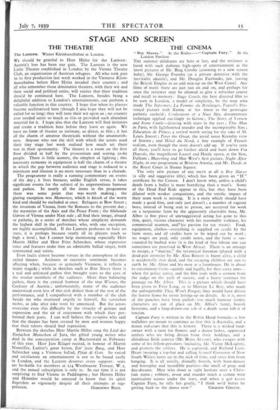STAGE AND SCREEN
THE THEATRE
The Lantern. Wiener Kleinkunstbane in London.
WE should be grateful to Herr Hitler for the Lantern: Austria's loss has been our gain. The Lantern is the new Little Theatre established in London by the Vienna Theatre Club, an organisation of Austrian refugees. All who took part
in its first production last week worked in the Viennese Klein- kunstbiihrte before Herr Hitler invaded their country ; and
all who remember those diminutive theatres, with their wit and their social and political satire, will rejoice that their tradition should be continued here. The Lantern, besides being a delightful addition to London's entertainments, can perform a valuable function in this country. I hope that when its playcts become acclimatised here (though I also hope they will not be exiled for so long) they will turn their wit upon us ; no country ever needed satire so much as this or provided such abundant material for it. I hope also that the Lantern will find imitators and create a tradition here before they leave us again. We have no form of theatre so intimate, so direct, as this ; it has all the charm of amateur theatricals without the amateurish- ness. Anyone who saw the skill with which the actors used their tiny stage last week realised how much art there was in their spontaneity. The theatre is a room on the first floor divided in half by the proscenium and seating 50-60 people. There is little scenery, the simplest of lighting ; this necessary economy in equipment is half the charm of a theatre in which the gap between audience and stage is reduced to a minimum and illusion is no more necessary than in a charade. The programme is really a running commentary on events of the day ; it lives because, unlike English revue, it takes significant events for the subject of its unpretentious humour and pathos. In nearly all the items in the programme there was some point that was worth making ; the glaring exception was Memories, which is kitsch of the worst kind and should be excluded at once. Refugees at Bow Street ; the invasions of Vienna, from the Romans to the present day ; the mysteries of the Axis and the Peace Front ; the blithende Giirten of Vienna under Nazi rule ; all find their image, absurd or pathetic, in a series of sketches whose simplicity demands the highest skill in the performers, who, with one exception, are highly accomplished. If the Lantern professes to have no stars, it is perhaps because nearly all its players reach so high a level ; but I cannot help mentioning especially Herr Martin Miller and Herr Fritz Schrecker, whose expressive voice and features make him an admirable ballad singer, both sentimental and satiric.
Even faults almost become virtues in the atmosphere of this exiled theatre. Archness or excessive sentiment becomes affecting when, because so genuinely Viennese, it reflects a major tragedy ; while in sketches such as Bow Street there is a real and unforced pathos that brought tears to the eyes of the weaker members of the audience. More than balancing pathos, there is the cynical humour of the true Wiener, the Cockney of Austria ; unfortunately, many of the audience understood even less of this rich dialect than of the rest of the performance, and I sympathised with a member of the club beside me who muttered angrily to himself, Sie verstehen nichts, as joke after joke went by unnoticed. But the actors overcame even this difficulty by the vivacity of gesture and expression and the air of enjoyment with which they per- formed their parts. I can well believe the compere who said that the theatre has been created by men and women happy. that their talents should find expression.
Between the sketches Herr Martin Miller sang the Lied des Einfachen Menschen of Jura, the gifted young writer who died in the concentration camp at Buchenwald in February of this year. Herr Jaro Kliiger recited, in honour of Martin Niemoller, Luther's great hymn, Ein' feste Burg, and Herr Schrecker sang a Viennese ballad, Pfiiat di Gott. So varied and satisfactory an entertainment is not to be found easily in London, and the Lantern deserves every support: seats are bookable for members at 124 Westbourne Terrace, W. 2, and the annual subscription is only is. In our time it is not surprising to find Vienna in Paddington ; but Herren Hitler and Hinunler would be annoyed to know that its spirit flourishes so vigorously despite all their attempts at sup-










































 Previous page
Previous page